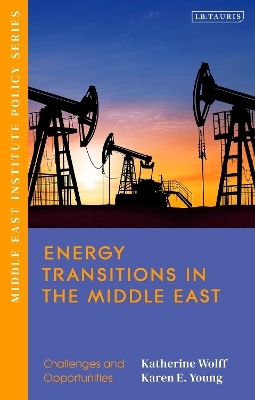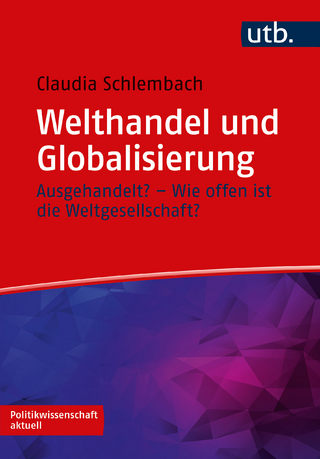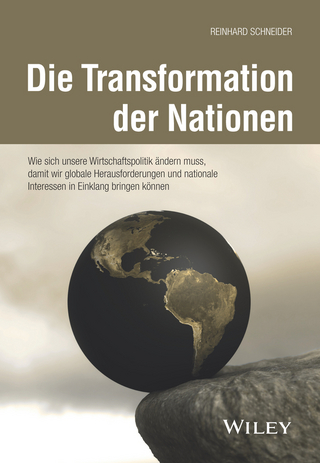
Energy Transitions in the Middle East
I.B. Tauris (Verlag)
978-0-7556-5038-5 (ISBN)
The Middle East is revealed to be a key site of new energy production, sharing and transmission as well as technology innovation. At the same time, the authors examine the variables that determine the success in each country and energy source, including the advantages that hydrocarbon producers will have in renewables and transition fuels, and the risk that these might slow down the energy transition overall. In doing so, the book situates the energy transition in the Middle East in a broader context of economic development, financing models, and regulations, and explains how this context interacts with the development of new energy sources.
Energy Transitions in the Middle East is an account of the challenges Middle Eastern states will face in navigating the global energy transition, as well as their key areas of opportunity.
Katherine Wolff is Graduate Research Fellow with the Economics and Energy Program at the Middle East Institute, USA. She studies at Johns Hopkins University School of Advanced International Studies (SAIS), USA where she focuses on Middle East security and energy. Previously she was Associate Director for the Atlantic Council's Middle East Security Initiative. Karen E. Young is Senior Fellow and Founding Director of the Program on Economics and Energy at the Middle East Institute, USA.Previously she was visiting fellow at the American Enterprise Institute, USA. She is the author of The Economic Statecraft of the Gulf Arab States (2023) and The Political Economy of Energy, Finance and Security in the United Arab Emirates (2014) and her analysis has appeared in Bloomberg Opinion, Foreign Policy Magazine, The Financial Times, The New York Times, The Wall Street Journal, and The Washington Post.
1. Front Matter
1.1. Introduction
Karen E. Young, Non-Resident Senior Fellow and Founding Director of the Program on Economics and Energy at the Middle East Institute
2. Financing, Regulation, and Economic Development for the Energy Transition
2.1. A Look Back at 2020: GCC COVID-19 Response, Reforms, Energy Transition Concerns & Micro-Competitiveness
Yesar Al-Maleki, Energy Economist and Consultant
2.2. The Future of Gulf NOC-IOC Partnerships
Colby Connelly, Research Analyst at Energy Intelligence
2.3. Mechanisms to Finance Climate Investments in the Middle East and North Africa
Lama Kiyasseh, Investment Officer at the International Finance Corporation
2.4. Political Priorities and Economic Realities: Financing the Renewable Energy Transition in Saudi Arabia and Oman
Piotr G.S. Schulkes, Non-Resident Scholar at the Middle East Institute
2.5. The Political Dimensions of Energy Transition in MENA: A Changing Landscape at the National, Regional, and Global Levels
Younes Abouyoub, Chief of Governance and State-Building Division for the MENA Region at the United Nations
3. New Energy Technologies and their Development in the Middle East
3.1. Connectivity, Grids, and Energy Storage
Jessica Obeid, Senior Global Advisor for Azure Strategy
3.2. The Next Big Thing in MENA Power – Grids, Connectivity, and Energy Storage
Michael Tanchum, Professor at Universidad de Navarra
4. Case Studies in the Energy Transition
4.1. Qatar’s LNG Industry in the Age of Hydrocarbon Markets Instability and Energy Transition
Nikolay Kozhanov, Research Associate Professor at Qatar University
4.2. Renewable Energy Diplomacy: The Gulf States in the Caucasus and Central Asia
Li-Chen Sim, Assistant Professor at Khalifa University
5. Conclusion
Karen E. Young, Non-Resident Senior Fellow and Founding Director of the Program on Economics and Energy at the Middle East Institute
| Erscheinungsdatum | 09.01.2024 |
|---|---|
| Reihe/Serie | Middle East Institute Policy Series |
| Sprache | englisch |
| Maße | 138 x 216 mm |
| Themenwelt | Technik ► Elektrotechnik / Energietechnik |
| Technik ► Umwelttechnik / Biotechnologie | |
| Wirtschaft ► Volkswirtschaftslehre ► Wirtschaftspolitik | |
| ISBN-10 | 0-7556-5038-7 / 0755650387 |
| ISBN-13 | 978-0-7556-5038-5 / 9780755650385 |
| Zustand | Neuware |
| Haben Sie eine Frage zum Produkt? |
aus dem Bereich


